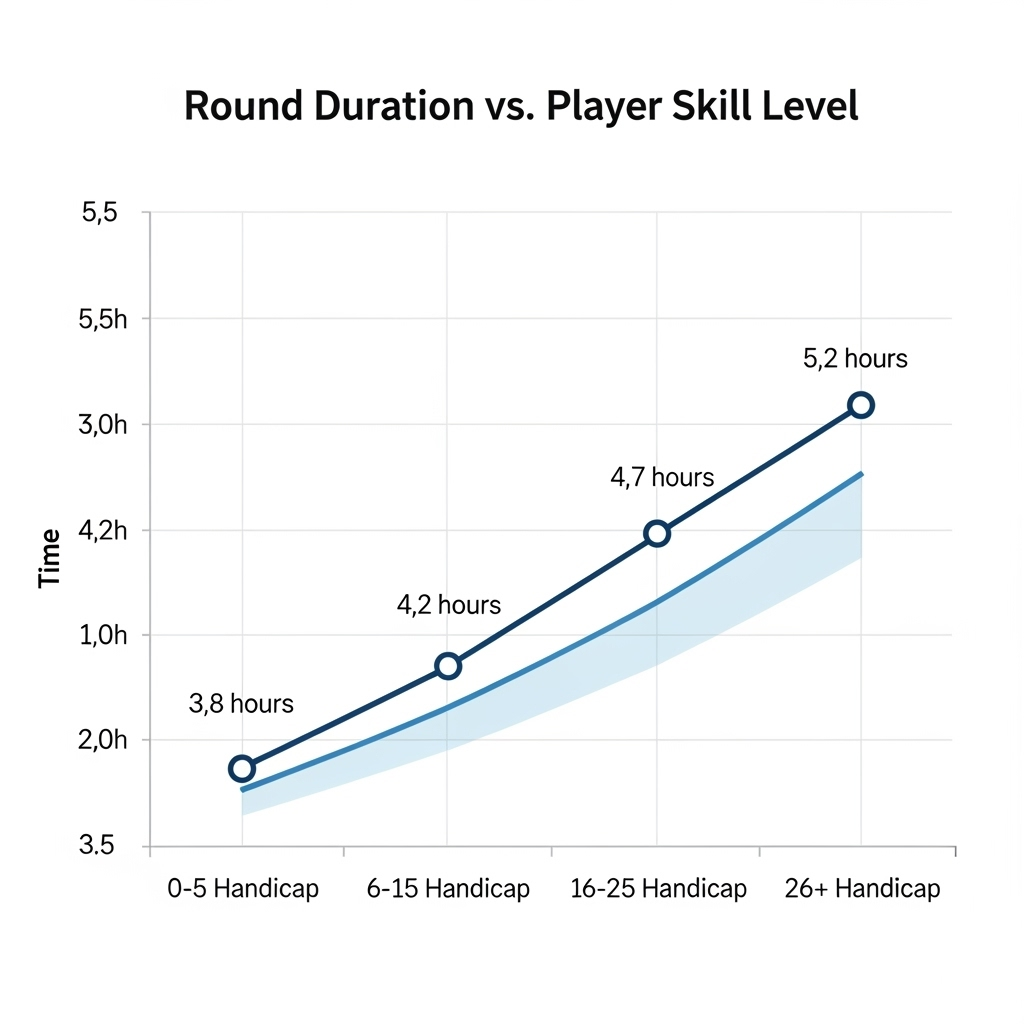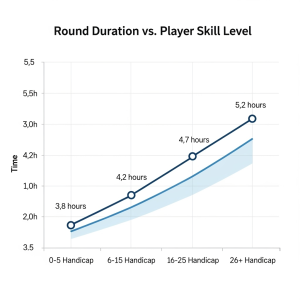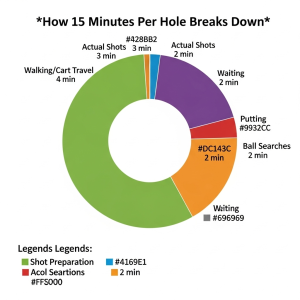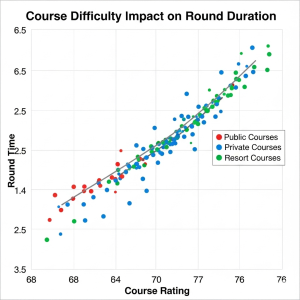How Long Does 18 Holes of Golf Take? (Plus Tips to Play Faster)
Last Updated: July 2025
"How long will this take?"
It's one of the first questions every new golfer asks, and for good reason.
Whether you're planning your first round, trying to fit golf into a busy schedule, or wondering what to tell your family about when you'll be home, understanding golf timing is crucial for enjoying the game.
The short answer? A typical round of 18 holes takes 4 to 4.5 hours for a foursome. But like everything in golf, it's more complicated than that.
Course conditions, skill levels, course management, and even the time of day can dramatically affect how long you'll be on the course.
After timing hundreds of rounds across different skill levels and course types, I've learned that understanding golf pace isn't just about managing expectations – it's about making the game more enjoyable for everyone.
In this complete guide, you'll discover:
- Average times for different group sizes and skill levels
- What factors speed up or slow down your round
- Course-specific timing expectations (municipal vs. private vs. resort)
- Proven strategies to play faster without rushing
- Golf etiquette that keeps everyone moving
- How to plan your golf day like a pro
Let's break down everything you need to know about golf timing.
Average Time for 18 Holes: The Real Numbers
Standard Timing Expectations
Single Player: 2.5-3.5 hours
- Best case: 2.5 hours (empty course, cart, good player)
- Average: 3 hours (normal conditions)
- Worst case: 3.5 hours (crowded course, walking)
Twosome: 3-4 hours
- Best case: 3 hours (experienced players, good pace)
- Average: 3.5 hours (typical weekend round)
- Worst case: 4 hours (slower players, busy course)
Threesome: 3.5-4.5 hours
- Best case: 3.5 hours (all experienced, moving well)
- Average: 4 hours (mixed skill levels)
- Worst case: 4.5 hours (beginners, peak times)
Foursome: 4-5+ hours
- Best case: 4 hours (experienced group, good conditions)
- Average: 4.5 hours (most weekend rounds)
- Worst case: 5+ hours (beginners, crowded course, poor conditions)
According to Golf Digest's pace of play study, the average round time has increased by 30 minutes over the past 20 years, primarily due to course difficulty and player expectations.
What Affects How Long Golf Takes?
Player Skill Level Impact
Low Handicappers (0-10):
- Average: 3.5-4 hours
- Fewer shots, quicker decisions
- Better course management
- Less time searching for balls
Mid Handicappers (11-20):
- Average: 4-4.5 hours
- More shots but reasonable pace
- Some course management issues
- Occasional ball searches
High Handicappers (21+):
- Average: 4.5-5+ hours
- Many more shots per hole
- Frequent ball searches
- Course management challenges
- Equipment struggles
Course Type Differences
Municipal/Public Courses:
- Average: 4.5-5.5 hours
- Peak times: Often 5+ hours
- Challenges: Higher volume, mixed skill levels, less staff oversight
Semi-Private Courses:
- Average: 4-4.5 hours
- Peak times: 4.5-5 hours
- Advantages: Better pace management, member awareness
Private Clubs:
- Average: 3.5-4.5 hours
- Peak times: 4-4.5 hours
- Advantages: Consistent membership, pace enforcement, better conditions
Resort Courses:
- Average: 4.5-5+ hours
- Peak times: 5-6 hours
- Challenges: Vacation mindset, photography, unfamiliar layout
Weather and Seasonal Factors
⛅ Weather Impact on Golf Timing
- ☀️ Perfect Weather: Baseline time
- 💨 Light Wind: +15 minutes
- 🌪️ Heavy Wind: +30 minutes
- 🌦️ Light Rain: +20 minutes
- ❄️ Cold Weather: +25 minutes
- 🌡️ Hot Weather: +10 minutes
Ideal Conditions (70-80°F, calm): Standard times apply
Wind Impact:
- Light breeze: +10-15 minutes
- Moderate wind (15-25 mph): +20-30 minutes
- Strong wind (25+ mph): +45+ minutes
Temperature Effects:
- Cold weather (under 50°F): +20-30 minutes (extra layers, stiffer muscles)
- Hot weather (over 90°F): +10-20 minutes (more water breaks, fatigue)
Precipitation:
- Light rain: +15-30 minutes (slower play, equipment concerns)
- Heavy rain: Often leads to suspension of play
Time Breakdown: Where the Hours Go
Average Time Per Hole: 12-18 minutes
Efficient Holes (Par 3s, good players): 8-12 minutes Standard Holes: 12-15 minutes
Slow Holes (difficult par 5s, beginners): 18-25 minutes
Time Wasters:
- Excessive pre-shot routine: 30+ seconds per shot adds up
- Ball searching: 3-5 minutes per lost ball
- Equipment delays: Forgetting clubs, wrong club selection
- Social chatting: Important but needs timing
- Overthinking shots: Analysis paralysis
Time Savers:
- Ready golf: Hit when ready, not just when "away"
- Continuous putting: Finish out when close
- Efficient walking/riding: Direct routes to balls
- Pre-planning: Club selection while others play
Peak Times vs. Off-Peak: When to Play
🕐 Golf Course Traffic Patterns
🟢 Best Times (Fast Play):
- 7-9 AM Weekdays
- 2-4 PM Weekdays
- Average: 3.5-4 hours
🟡 Moderate Times:
- 10-12 PM Weekdays
- 5-6 PM Weekends
- Average: 4-4.5 hours
🔴 Avoid Times (Slow Play):
- 8-11 AM Weekends
- 12-3 PM Weekends
- Average: 5+ hours
Fastest Round Times:
Weekday Mornings (7-10 AM):
- Average: 3.5-4 hours
- Less crowded, serious golfers
- Good course conditions
Weekday Afternoons (1-4 PM):
- Average: 3.5-4.5 hours
- Often fastest times
- May have course maintenance
Sunday Late Afternoon:
- Average: 4-4.5 hours
- Clearing out from morning rush
- Good pace if weather holds
Slowest Round Times:
Saturday Morning (8-11 AM):
- Average: 5-6 hours
- Peak weekend demand
- Mixed skill levels
- Often tournament play
Weekend Afternoons:
- Average: 4.5-5.5 hours
- Backed up from morning
- Casual players
Holiday Weekends:
- Average: 5-6+ hours
- Maximum course usage
- Many occasional golfers
Course Management for Faster Play
Tee Time Strategy
⏰ Optimal Tee Time Selection Guide
🟢 Fast Play Windows:
- First tee time of day (6:30-7:30 AM)
- Weekday afternoons (1-4 PM)
- Late afternoon weekends (after 4 PM)
🔴 Avoid for Speed:
- Weekend mornings (8-11 AM)
- Weekend early afternoons (12-3 PM)
- Tournament days and league nights
Preparation That Saves Time
Before You Arrive:
- Check course conditions and delays
- Review course layout and yardages
- Prepare equipment and ensure everything works
- Plan arrival time (30 minutes early minimum)
At the Course:
- Complete check-in and payment quickly
- Use practice time efficiently
- Confirm group and any course-specific rules
- Get cart or pull-cart ready
On the Course:
- Keep multiple balls and tees easily accessible
- Know your yardages and club distances
- Plan shots while others are playing
- Stay aware of group behind you
Proven Strategies to Play Faster
Ready Golf Principles
According to the USGA's Ready Golf guidelines, these practices dramatically improve pace:
Tee Box:
- Lower handicap player can tee off first if ready
- Hit provisional balls immediately if needed
- Move to next tee while others finish putting
Fairway:
- Play when ready and safe, regardless of who's "away"
- Shorter hitters can hit first if others are waiting
- Keep carts/bags positioned for quick exit
Around the Green:
- Park equipment on exit side of green
- Multiple players can putt simultaneously if safe
- Read putts while others are playing
General:
- Continuous putting when close to hole
- Help others look for balls
- Keep pace with group ahead, not away from group behind
Equipment and Technical Tips
Cart Management:
- Share carts efficiently
- Park strategically near next tee
- Each player takes multiple clubs
- Keep scorecards easily accessible
Walking Efficiency:
- Use pull carts or carry light bags
- Take direct routes to balls
- Bring extra balls and tees
- Keep rain gear accessible
Course Etiquette for Speed
Ball Searches:
- Maximum 3 minutes (official rule)
- Multiple people help search
- Play provisional if ball might be lost
- Don't search in clearly unplayable areas
Green Play:
- Mark balls that interfere with others
- Repair ball marks while others putt
- Remove flagstick efficiently
- Exit green promptly when done
When Slow Play Happens: Managing Delays
🚦 Delay Management Guide
If course is backed up everywhere:
- ❌ Wait patiently
- ✅ Use time for practice
- ❌ Don't ask to play through
- ⏱️ Time Impact: +30-60 minutes
If there's clear space ahead:
- ✅ Politely ask to play through
- ✅ Wait for safe moment
- ✅ Thank them graciously
- ⏱️ Time Impact: -15-30 minutes
Common Delay Situations
Group Ahead Playing Slowly:
- Wait patiently if course is generally backed up
- Politely ask to play through if there's open space ahead
- Use time for practice (putting, chipping if safe)
- Stay positive - frustration affects your game
Weather Delays:
- Lightning: Immediate suspension, wait in clubhouse
- Heavy rain: May continue or suspend based on course policy
- Wind: Play continues but expect longer round
Course Maintenance:
- Cart path only: Adds 15-30 minutes
- Temporary greens: May speed up or slow down play
- Hole closures: Usually allows drop/skip options
Playing Through Etiquette
When to Ask:
- Clear space ahead of slow group
- Significantly faster pace of play
- Groups are different sizes (smaller plays through larger)
How to Ask:
- Approach politely and wait for appropriate time
- "Would it be possible for us to play through?"
- Thank them graciously regardless of response
- Maintain friendly attitude
When You're Asked:
- Generally say yes if practical
- Choose safe spot for passing (tee box or green)
- Wave group through and step aside
- Continue your round normally
Special Timing Considerations
Tournament Play
Scrambles: 4.5-5.5 hours
- Longer due to strategy discussions
- Multiple shot options slow decision making
- Often includes festivities and prizes
Stroke Play Events: 5-6 hours
- Formal rules enforcement
- Scorekeeping requirements
- Pace monitoring by officials
Charity Events: 5-7 hours
- Often include beginners
- Multiple activities between holes
- Socializing is part of the experience
Course Difficulty Impact
Easy Courses (Rating under 70):
- Wider fairways, fewer hazards
- Average: 3.5-4.5 hours
- Less ball searching and penalty shots
Moderate Courses (Rating 70-73):
- Balanced challenge and playability
- Average: 4-5 hours
- Standard pace expectations
Difficult Courses (Rating over 73):
- Narrow fairways, many hazards
- Average: 4.5-5.5+ hours
- More lost balls and difficult shots
Planning Your Golf Day
Time Management Tips
⏰ Complete Golf Day Timeline
🚗 Arrive Early (30 min before):
- Check in & pay
- Get cart/equipment
- Use restroom
🏃♂️ Warm-Up (15-20 min):
- Practice putting
- Hit range balls
- Stretch muscles
⛳ Play Round (4-4.5 hours):
- Maintain good pace
- Enjoy the game
- Stay hydrated
🍺 Post-Round (30-45 min):
- Record scores
- Grab refreshments
- Social time
📋 Total Planning Time: 5.5-6 hours
Conservative Planning (Add 30 minutes to estimates):
- Account for unexpected delays
- Buffer time for enjoyment
- No rushing between activities
Communication with Family/Work:
- "I'll be gone for about 5-6 hours"
- Include travel time to/from course
- Plan for potential weather delays
Food and Hydration:
- Eat before or plan for turn meal
- Bring water and snacks
- Account for 19th hole socializing
Seasonal Adjustments
Spring Golf:
- Longer rounds due to course conditions
- Weather unpredictability
- Rusty players returning
Summer Golf:
- Earlier tee times for heat avoidance
- Slower play in extreme heat
- Peak season crowds
Fall Golf:
- Generally good pace
- Shorter daylight hours
- Weather variability
Winter Golf (where applicable):
- Cart path restrictions add time
- Slower greens and conditions
- Fewer players but challenging conditions
Technology for Timing and Pace
Helpful Apps and Tools
Pace Tracking:
- 18Birdies - Real-time pace monitoring
- GolfLogix - Course GPS and timing
- TheGrint - Social pace comparisons
Course Information:
- GolfNow - Tee time booking with pace info
- Course websites - Real-time conditions and delays
- Local weather apps - Plan for weather impacts
GPS and Rangefinder Benefits
Faster Club Selection:
- Instant yardages reduce guessing
- Confidence in club choice
- Less time walking to check distances
Course Navigation:
- Reduced time finding targets
- Better course management
- Efficient cart/walking routes
Frequently Asked Questions
"Can I play 18 holes in 3 hours?"
Yes, under ideal conditions:
- Playing alone or as a twosome
- Empty or nearly empty course
- Using a cart
- Good weather
- Experienced players
"Why do some rounds take 6+ hours?"
Common causes:
- Peak weekend times with course backups
- Large groups of beginners
- Tournament play or special events
- Poor weather conditions
- Course maintenance issues
"What's considered slow play?"
Generally:
- Acceptable: 4.5 hours for foursome
- Getting slow: 5+ hours
- Problematic: 5.5+ hours
- Course intervention needed: 6+ hours
"Should beginners play during busy times?"
Recommendations:
- Best: Weekday afternoons or twilight rates
- Avoid: Weekend mornings and peak times
- Consider: Taking a lesson first to learn pace
- Alternative: Start with 9 holes during busy periods
"How do I handle pressure from groups behind?"
Stay calm and:
- Maintain your normal pace (don't rush and make mistakes)
- Let faster groups play through when safe
- Focus on ready golf principles
- Remember everyone was a beginner once
"What if weather delays my round?"
Be flexible:
- Lightning delays are mandatory - seek shelter immediately
- Rain delays vary by course policy
- Have backup plans for severe weather
- Some courses offer rain checks or partial refunds
Your Complete Golf Timing Strategy
Understanding golf timing transforms the game from a source of stress into pure enjoyment.
Whether you're planning your first round or trying to optimize your regular golf schedule, these insights will help you make the most of your time on the course.
Key takeaways:
- Plan for 4.5-5 hours for a typical foursome round
- Avoid peak times (weekend mornings) when possible
- Practice ready golf to maintain good pace
- Communicate realistic timelines to family and friends
- Stay flexible with weather and course conditions
- Focus on enjoyment over speed
Remember: Golf is meant to be enjoyed, not rushed. Good pace of play enhances everyone's experience while respecting other golfers' time.
The perfect round balances efficient play with the social and recreational aspects that make golf special. With proper planning and awareness, you can ensure your golf time is both enjoyable and respectful to others.
Planning your first round? Check out our guides on golf swing basics for beginners and essential golf equipment for new players to be fully prepared.
Related Articles:
- What Should My Golf Score Be as a Beginner? Realistic Expectations
- Golf Etiquette for Beginners: Essential Do's and Don'ts
- What Does Golf Handicap Mean? Complete Beginner's Guide
Have questions about golf timing or pace of play? Leave a comment below and I'll help you plan your perfect golf day.





